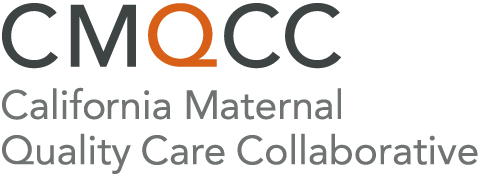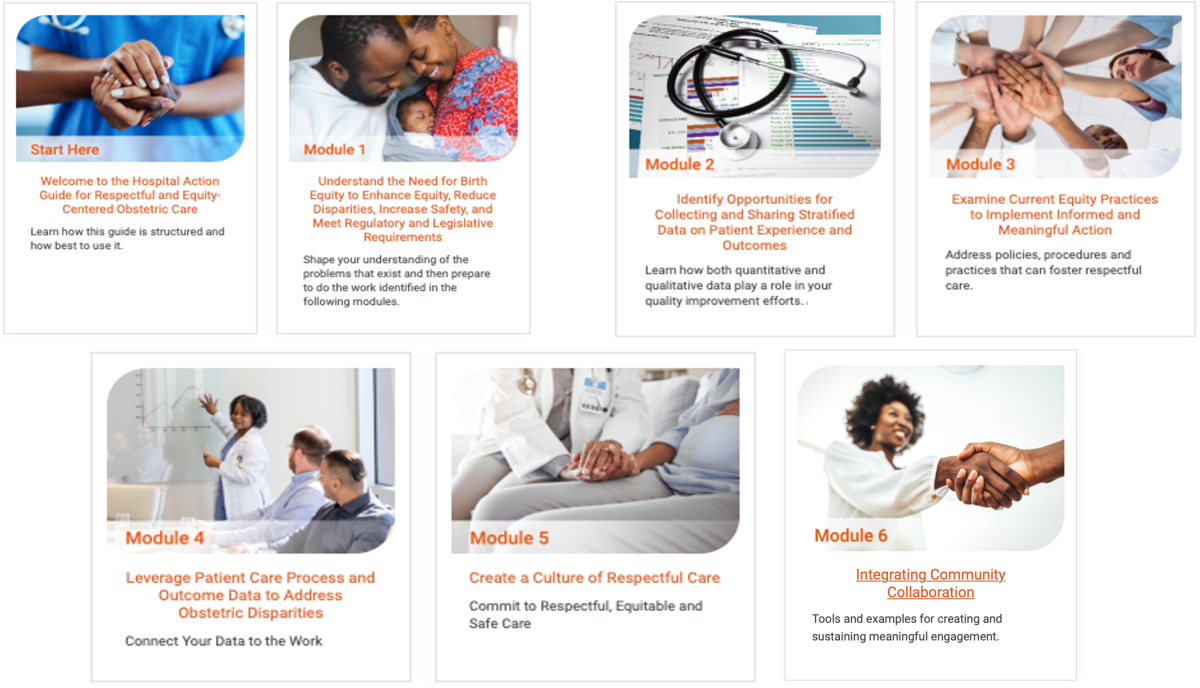
Since its inception, CMQCC's mission has been to end preventable morbidity, mortality, and racial disparities in California maternity care. Through many partnerships, CMQCC's quality improvement toolkits and collaboratives have been successful in lowering maternal mortality rates in California. However, significant racial, ethnic, and other disparities remain in maternal care and these disparities require urgent action.
Perinatal Equity Initiatives
CMQCC continues its pledge to work collaboratively with hospitals, patients, communities, and other partners to identify and promote best practices for equitable maternity care. Based on years of work with a five-hospital pilot collaborative, and its Birth Equity Implementation Guide Task Force, CMQCC launched three distinct efforts (detailed below) to promote respectful care and equity. Lessons learned from CMQCC’s pilot collaborative suggest that quality improvement efforts addressing equity and respectful care are very complex and require the changing of minds and behaviors, as well as drawing on the work of the heart.
CMQCC is not an expert in this space and acknowledges the many birth equity pioneers for leading the way, and patients for sharing their stories that inspire the work.
The Learning Initiative for Supporting Vaginal Birth through an Equity Lens
CMQCC is renewing California’s efforts to reduce cesareans in all low-risk pregnant patients by conducting a statewide hosptial collaborative-like learning experience with five-year (September 2022-2027) funding from the Centers for Disease Control and Prevention.
The Learning Initiative for Supporting Vaginal Birth Through an Equity Lens (Learning Initiative), launched in spring 2023, is focused on reducing disparity gaps in low-risk cesareans with a goal of all patient groups reaching or exceeding the Healthy People 2030 target rate. CMQCC will conduct the Learning Initiative in multiple cohorts for 18 months, starting new rounds every nine months with two cohorts in each round.
Curriculum for the Learning Initiative will follow the CMQCC Hospital Action Guide for Respectful and Equity-Centered Obstetric Care. To support California hospitals not yet participating in the Learning Initiative, CMQCC will host free quarterly webinars teaching key elements of the curriculum and offering additional technical assistance during monthly virtual office hours.
Engaged since 2019, the CMQCC Pilot Birth Equity Collaborative members remain helpful and will participate as mentors and guest faculty for the Learning Initiative.
Please check our upcoming events page to register for the next Perinatal Equity webinar in the series, ""Let's Talk Perinatal Equity: Moving Beyond Implicit Bias Training."
The Hospital Action Guide for Respectful and Equity-Centered Obstetric Care
With the goal of improving maternal outcomes for all women and birthing people, CMQCC and its partners developed The Hospital Action Guide for Respectful and Equity-Centered Obstetric Care (Hospital Action Guide). In August 2023, CMQCC launched the Hospital Action Guide comprised of six educational and action-oriented modules for all CMQCC California member hospitals through its Accounts portal.
The Hospital Action Guide was developed with two purposes: First, it will help California hospital users understand the drivers of inequities in maternal care and deepen the understanding of how and why racism, discrimination and implicit bias are root causes of maternal inequities. Second, the Hospital Action Guide provides hospital maternity teams with a sample of action-oriented, equity-centered tools and resources that go beyond implicit bias training and, if followed, may translate into real change in culture and patient care.
Hospital Action Guide consists of six modules:
1) Understand the Need for Birth Equity to Enhance Equity, Reduce Disparities, Increase Safety, and Meet Regulatory and Legislative Requirements.
2) Identify Opportunities for Collecting and Sharing Stratified Data on Patient Experience and Outcomes.
3) Examine Current Equity Practices to Implement Informed and Meaningful Action.
4) Leverage Patient Care Process and Outcome Data to Address Obstetric Disparities.
5) Create a Culture of Respectful Care.
6) Integrating Community Collaboration.
Since 2019, CMQCC has been working collaboratively with five hospitals to develop, implement and test tools and protocols aimed at improving equitable care practices, in addition to consistently delivering respectful care. This Hospital Action Guide is one of those tools.
For more information on creating a CMQCC Account, please view the CMQCC Accounts Tutorial.
Culture of Equity Survey
CMQCC and its partners developed and fielded a Culture of Equity Survey to assist hospitals with gaining insight into the status of equity perspectives and efforts within their maternal care units and organizations. The survey serves as a measurement of obstetric unit equity perspectives and attitudes and as a benchmark comparison to track improvements in equitable and respectful practices.
The survey was deployed in pilot collaborative hospitals, and it will soon be available to additional CMQCC member hospitals following an analysis of pilot responses and lessons learned. Additionally, CMQCC will assist hospitals participating in the Learning Initiative to Support Vaginal Birth Through an Equity Lens to deploy the survey in late 2023 through early 2024.

